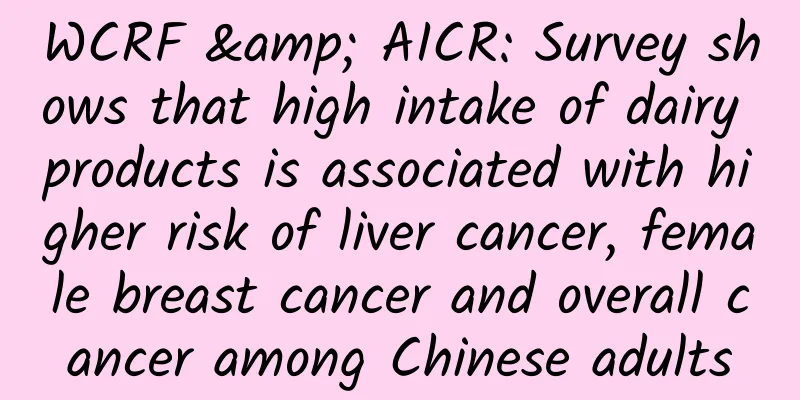WCRF & AICR: Survey shows that high intake of dairy products is associated with higher risk of liver cancer, female breast cancer and overall cancer among Chinese adults

|
For most people, dairy products are foods with high nutritional value. Dairy products not only provide high-quality protein, vitamins B2 and B12, and nutrients such as calcium, but the lactose in milk can also promote the absorption of minerals such as calcium, iron, and zinc. However, worldwide, there has been controversy about the impact of dairy products on cancer. The World Cancer Research Fund/American Institute for Cancer Research (WCRF/AICR) pointed out that dairy products may be beneficial in preventing colorectal cancer, but a higher intake of dairy products is associated with a higher risk of prostate cancer. Because many Chinese people have difficulty digesting and absorbing lactose and their dairy intake has always been low, relevant research conducted in the Chinese population is very limited. Recently, a study published in BMC Medicine has added important evidence to the impact of Chinese people's consumption of dairy products on cancer. Data from more than 10 years of follow-up of 500,000 people in different regions of China showed that among Chinese adults, a higher intake of dairy products was associated with a higher risk of liver cancer, female breast cancer, and overall cancer. The paper pointed out that this study is "the first and largest prospective cohort study in China" on dairy products and cancer risk. The research was conducted by a team of experts from the University of Oxford, Peking University School of Public Health, Chinese Academy of Medical Sciences Fuwai Hospital, Chinese Academy of Medical Sciences, Henan Center for Disease Control and Prevention, and China National Center for Food Safety Risk Assessment. The research team also objectively stated in the paper that despite adjusting for a series of confounding factors, this study is not enough to confirm that this association is causal. These findings and the accumulation of evidence from more studies in the future may provide important information for evidence-based dietary recommendations for cancer prevention suitable for the Chinese population. Currently, the "Dietary Guidelines for Chinese Residents (2022)" recommends that healthy people aged 2 years and above drink 300 ml to 500 ml of milk or an equivalent amount of dairy products every day. Research Methods This large-scale prospective study was conducted based on the China Kadoorie Biobank (CKB) and covered about 510,000 people. These participants joined the study between 2004 and 2008, with an average age of 52 years old at the time, and came from five urban areas of Qingdao, Harbin, Haikou, Suzhou and Liuzhou, as well as five rural areas in Sichuan, Gansu, Henan, Zhejiang and Hunan. All participants did not have cancer when they joined the study. The researchers used questionnaires to record the participants' eating habits over the past year. To facilitate the evaluation of diet, the researchers divided all foods into 12 groups, namely rice, wheat products, whole grain products, red meat, poultry, fish, eggs, total dairy products, fresh vegetables, pickled vegetables, fresh fruits, and soy products; and divided the frequency of food intake into 5 categories, namely eating every day, 4-6 days a week, 1-3 days a week, eating monthly, and never/rarely eating. The vital health status of the participants was determined based on information from the Chinese Disease Surveillance System, Cancer Registry, and National Health Insurance Claims Database. Study Results Among all participants, the average daily intake of dairy products was 37.9 grams. 20.4% of the participants consumed dairy products at least once a week (regular consumption habits), and their average daily intake was 80.8 grams. 68.5% of the people never or rarely consumed dairy products. Both men and women in urban areas had higher dairy product intake than those in rural areas. After an average follow-up of 10.8 years, a total of 29,277 people developed cancer. The researchers stratified the participants by high-risk age, gender, and region, and adjusted for family history of cancer, education, income, alcohol intake, smoking, physical activity, soy and fresh fruit intake, and body mass index (BMI). The results showed that dairy product intake was significantly positively correlated with the overall risk of cancer and the risk of cancer in certain specific parts (P<0.05). Specifically, for every 50-gram increase in daily dairy intake: was associated with a 7% increased risk of overall cancer (HR = 1.07, 95% CI 1.04–1.10); It was associated with a 12% increased risk of liver cancer (n=3191) (HR=1.12, 95% CI 1.02–1.22), independent of hepatitis B infection; It was associated with a 19% increased risk of breast cancer in women (n=2582) (HR=1.19, 95% CI 1.01–1.41); It was associated with a 17% increased risk of lymphoma (n=915) (HR=1.17, 95% CI 1.07–1.29). After multiple corrections, the researchers found that there was no statistically significant association between dairy intake and lymphoma risk. In addition, no significant relationship was observed between dairy intake and colorectal cancer or other cancer sites. The researchers also found that compared with those who ate no or little dairy, those who ate dairy products regularly: They were more likely to be female, highly educated, have higher income levels, and be in generally better health, but were also slightly more likely to have a history of cardiovascular disease or diabetes. On average, they are taller (0.6 cm taller) and have longer legs (0.3 cm longer). Weight and BMI were lower, with an average BMI of 0.4 kg/m2 lower in men and 0.5 kg/m2 lower in women. However, no clear association was observed between dairy product intake and waist circumference or body fat. Summarize The paper concludes that among Chinese adults with relatively low dairy intake, higher dairy intake may be associated with a higher risk of liver cancer, female breast cancer, and lymphoma. The effect of dairy intake on cancer is independent of other lifestyle factors (including obesity). Possible mechanisms include: Higher intake of dairy products may lead to increased plasma insulin-like growth factor-I (IGF-I), which plays a key role in cell proliferation and cancer development. Milk contains high levels of branched-chain amino acids, lactose and IGF-I, which can activate and enhance the signal transduction mechanism of rapamycin complex 1 (mTORC1), thereby promoting cell proliferation and possibly leading to carcinogenesis. Saturated fatty acids (SFA) and trans fatty acids in dairy products may be associated with insulin resistance and increased levels of pro-inflammatory cytokines, which may be risk factors for the development of liver cancer and lymphoma. Although the Chinese have significantly increased their dairy intake in recent decades (average intake increased from 14.9 g/day in 1992 to 24.7 g/day in 2012), it is still much lower than other countries (e.g., the average intake in the United States was about 400 g/day in 2015). The results of the study's analysis of height also support the role of dairy products in slowing bone loss. The paper stated that the study also has limitations, such as the questionnaire survey only collected information on the intake of some major food groups, without total energy, specific nutrients (such as SFA and calcium) or specific dairy products. Moreover, despite the large number of cancer cases recorded, the statistical power of some less common cancer sites (such as prostate cancer) is still low, and even for common cancer types, the number of cases may not be enough to obtain reliable results in subgroup analysis (for example, it is difficult to analyze the risk of breast cancer related to estrogen receptor status). In the future, more research is needed to further explore the potential mediating role of lactose intolerance between dairy product intake and cancer risk. Future studies are expected to determine its causal relationship and potential mechanisms. References [1] Kakkoura, MG. , Du, H. , Guo, Y. et al. , (2022). Dairy consumption and risks of total and site-specific cancers in Chinese adults: an 11-year prospective study of 0.5 million people. BMC Med 20, 134 (2022). https://doi.org/10.1186/s12916-022-02330-3 WuXi AppTec |
>>: As a high-EQ video website, how does Sohu Video achieve great things with little money?
Recommend
How to do it in the community? Selling community, get 2000+ accurate users with 0 budget!
With the advent of the 5G era, there are more and...
Want to sell fish at the market? You must first learn some basic knowledge about fish breeding
Produced by: Science Popularization China Author:...
ChatGPT is a big hit! Is it really that amazing? Who do you think wrote this article?
Recently, two artificial intelligence systems hav...
The blame for dizziness cannot be put on cervical spondylosis! A table clearly identifies the causes of dizziness
丨The popular science topic of this article comes f...
Why are the speeds and versions of APP updates different for Android and Apple?
iOS has become a company of its own with its power...
Landing on a rogue planet? Humans are looking for new ways to migrate across the stars
Recently, American scholars proposed an idea for ...
Event Operations | How to trigger an event with 30,000 people in 3 days with a budget of more than 3,000 yuan?
It's not a problem if the idea is old, it'...
What are the specific preferential treatment standards in 2022? Attached is the latest list of pension standards for preferential treatment recipients!
In recent years, the standards for preferential t...
Memory leak troubleshooting from entry to mastery
The most primitive memory leak test Repeat the op...
How to use Weibo marketing and promotion in 2022!
Brushing teeth and checking Weibo are the first t...
The mysterious π has been calculated to 100 trillion digits. How many secrets are there behind it?
Pi (abbreviated as π) is one of the most mysterio...
The new generation of Huawei Smart Screen V series revealed: comprehensive evolution of audio and video, creating a smart home center
Huawei has been in the smart TV market for nearly...
IEA: Global Energy Report 2020
The IEA has released its 2020 Global Energy Repor...
Spring Festival holiday arrangements for 12 app stores
360 Mobile Assistant Application & Game Revie...









